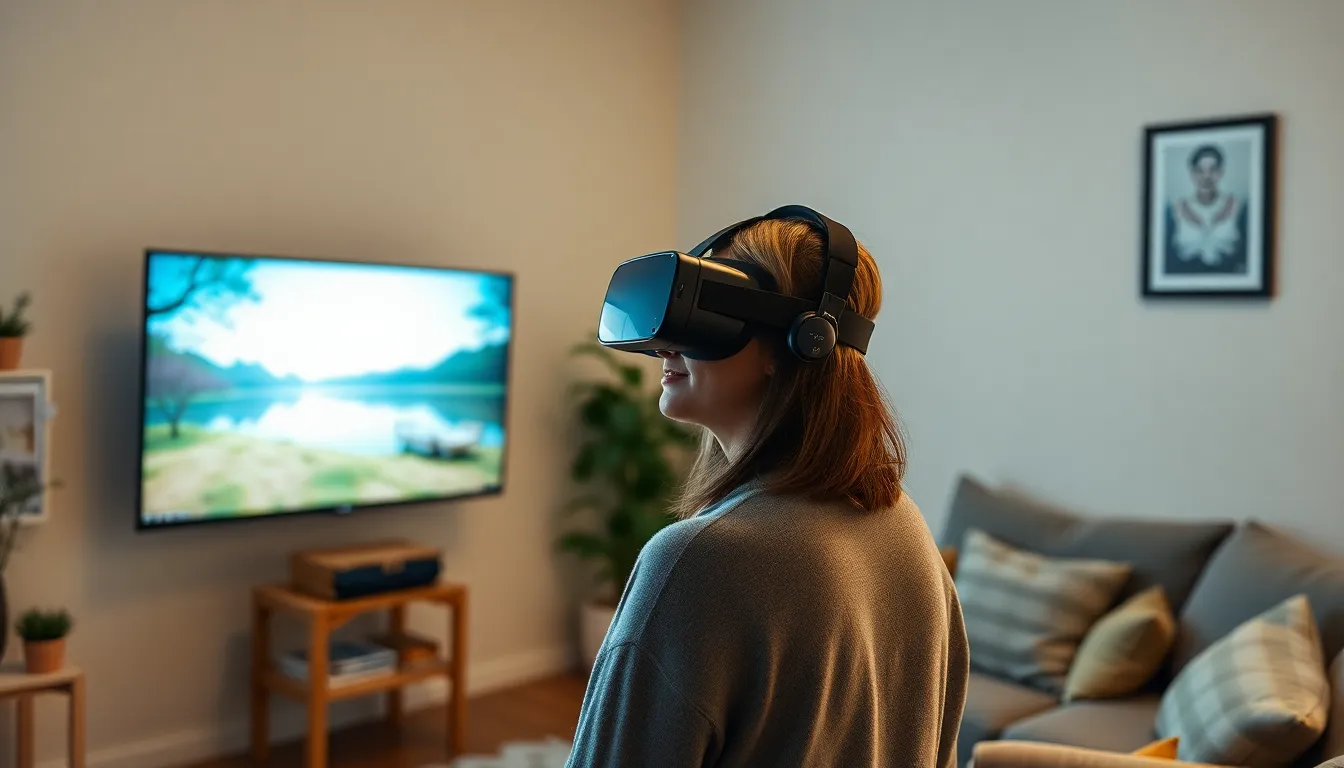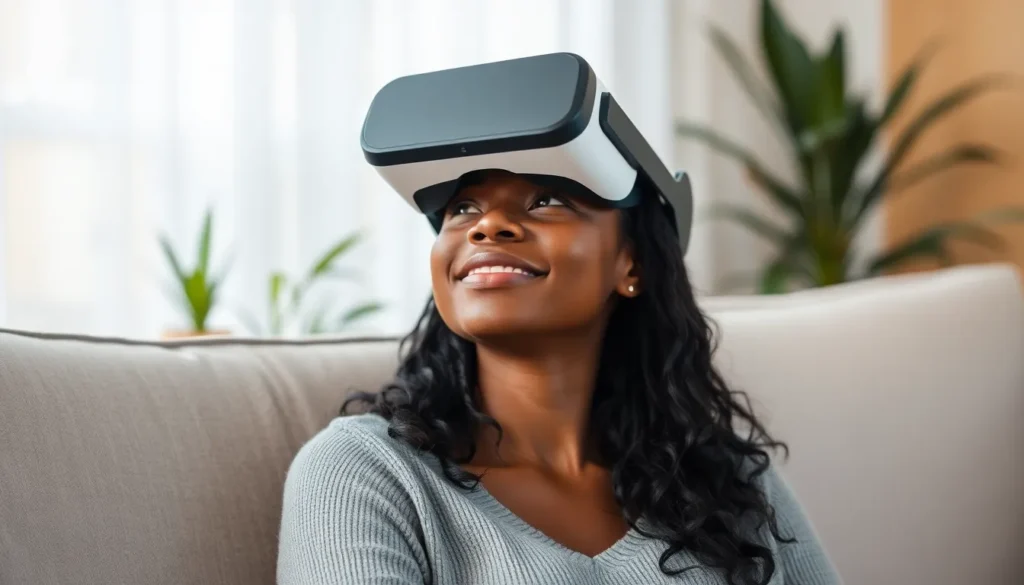In a world where stress can feel like a relentless video game boss, virtual reality (VR) is stepping in as the ultimate power-up for mental health. Imagine swapping your therapist’s office for a tranquil beach or a serene forest, all while wearing a headset that transports you there in seconds. It sounds like science fiction, but VR’s potential to revolutionize mental health care is very real.
From anxiety relief to immersive therapy sessions, VR offers a unique escape that traditional methods can’t match. It’s not just about dodging life’s curveballs; it’s about tackling them head-on in a controlled environment. As technology advances, the possibilities for healing and growth become endless. So, grab your headset and get ready to explore how VR can turn mental health treatment into an engaging adventure.
Table of Contents
ToggleOverview of VR for Mental Health
Virtual reality (VR) technology offers a transformative approach to mental health treatment. It immerses users in environments that promote relaxation and healing. Calming settings, such as tranquil beaches or serene forests, serve as effective alternatives to traditional therapy methods.
Numerous studies show VR’s effectiveness in alleviating anxiety symptoms. Patients using VR report reduced feelings of stress during controlled exposure therapy. This immersive experience enhances the therapeutic process by increasing engagement and participation.
The technology also supports cognitive behavioral therapy (CBT). By simulating real-life scenarios, VR helps individuals practice coping strategies in a safe space. They can build resilience against triggers associated with anxiety or phobias.
Practitioners increasingly adopt VR in clinical settings. Many mental health professionals utilize VR solutions to enhance therapy sessions. These sessions allow clients to confront fears and explore their emotions in a supportive environment.
As VR technology advances, opportunities for further applications within mental health care grow. Researchers continually explore its potential in treating depression, PTSD, and other mental health conditions. The adaptability of VR ensures that therapeutic techniques will evolve as the technology becomes more accessible.
VR provides innovative solutions for mental health treatment. Its ability to create immersive experiences and promote relaxation positions it as a valuable tool within contemporary therapy landscapes. Data supports its effectiveness, paving the way for more comprehensive mental health strategies.
Benefits of VR in Therapeutic Settings

VR technology offers significant advantages in therapeutic settings, improving mental health treatment outcomes. The immersive experience captivates users, making therapy sessions more dynamic and effective.
Enhanced Engagement and Immersion
Engagement levels increase significantly with VR therapy. Patients actively participate in a controlled, virtual environment, which makes them more receptive to treatment. This immersion fosters a deeper connection to therapeutic techniques, as users experience scenarios that evoke real emotions. Research indicates that individuals using VR report higher satisfaction with their treatment process. Engagement with the content boosts motivation and willingness to explore underlying issues. As a result, this enhanced interaction supports more productive sessions for both patients and therapists.
Personalized Treatment Options
Personalization becomes feasible with VR applications. Therapists can create tailored scenarios that address specific patient needs and preferences. These customizable environments enhance the therapeutic experience and improve outcomes. Patients find comfort in familiar or desirable settings, which can reduce anxiety during exposure therapy. Customization allows for gradual increases in challenge level, enabling clients to confront fears at their own pace. This adaptability aligns therapeutic goals with individual experiences, leading to more effective mental health support. The flexibility of VR also opens avenues for new treatment methods that are unique to each patient.
Applications of VR for Mental Health
Virtual reality (VR) possesses diverse applications in mental health treatment, enhancing therapeutic interventions across various disorders.
Anxiety and Stress Disorders
VR effectively reduces anxiety symptoms by immersing patients in calming environments. Studies indicate patients experience lower stress levels during exposure therapy with VR. Immersive experiences allow them to confront anxiety triggers safely. Engaging with simulated scenarios fosters better coping strategies, improving overall treatment outcomes. Mental health professionals recognize that integrating VR into therapy enhances patient involvement, leading to increased satisfaction.
PTSD Treatment
In treating post-traumatic stress disorder (PTSD), VR offers groundbreaking exposure therapy techniques. Survivors can confront traumatic memories in a controlled setting, significantly reducing emotional distress. Research demonstrates that virtual environments facilitate safe exploration of distressing situations, supporting healing and recovery. Therapists customize VR sessions to reflect specific experiences, enhancing relatability and therapeutic effectiveness. As technology advances, ongoing studies continue to reveal VR’s potential in transforming PTSD treatment.
Phobia Exposure Therapy
Phobias present unique challenges; however, VR provides an innovative solution through exposure therapy. Patients can gradually confront their fears within a safe and controlled virtual environment. This approach allows individuals to desensitize themselves effectively, reducing avoidance behaviors over time. Tailored experiences enable a gradual progression from mild to intense stimuli, promoting resilience. Research supports the success of VR in therapy for phobias, emphasizing its value in creating lasting change.
Challenges and Limitations
Virtual reality (VR) in mental health presents notable challenges and limitations. Awareness of these obstacles informs better implementation strategies.
Technological Barriers
Access to VR technology poses a significant challenge. Many individuals lack the necessary equipment, which restricts participation in therapeutic experiences. High costs associated with VR devices and software can deter clinicians from adopting this technology. Limited internet bandwidth hampers the effectiveness of cloud-based VR solutions. Moreover, the diverse range of VR systems complicates standardization in treatment protocols, leading to inconsistent patient experiences. Ensuring compatibility across devices remains essential to maximizing VR’s potential in mental health therapy.
Ethical Considerations
Ethical issues arise when implementing VR in therapy. Confidentiality concerns become prevalent as data collection increases with VR usage. Mental health professionals face the challenge of safeguarding sensitive patient information while utilizing immersive technology. Furthermore, some individuals may experience adverse reactions to virtual environments, potentially exacerbating anxiety rather than alleviating it. Clinicians must evaluate the appropriateness of VR for each patient, considering their unique circumstances and mental health conditions. Striking a balance between innovative treatment and patient safety is essential in navigating the ethical landscape of VR in mental health care.
Future Directions of VR for Mental Health
Emerging advancements in VR technology promise significant changes in mental health treatment. Researchers investigate richer, more interactive environments that can enhance therapeutic outcomes, focusing on artificial intelligence integration to tailor experiences. Health professionals consider the potential for VR to include biofeedback mechanisms, monitoring patient responses in real time and adjusting simulations accordingly.
Potential expansions into group therapy settings are underway, allowing multiple patients to interact in virtual spaces, which fosters shared experiences. Improved accessibility becomes crucial, with efforts to develop cost-effective VR solutions aimed at reaching underserved populations. Expansion of VR’s applications could encompass additional conditions, such as depression and obsessive-compulsive disorder.
Studies continue to yield promising results, showcasing VR’s role in exposure therapy and anxiety management. New focus areas include building resilience by combining VR with mindfulness and other holistic techniques. Training for clinicians on integrating VR into existing therapeutic modalities is also a priority, ensuring practitioners utilize the technology effectively and ethically.
Data indicates promising outcomes for patients engaged in VR-based treatments, marking a shift towards embracing digital tools in therapy. With ongoing collaboration between developers and mental health professionals, the future of VR in mental health appears optimistic. Enhanced personalization will strengthen the connection between patients and their therapy, deepening the impact of virtual experiences on emotional well-being.
Patient engagement is set to improve as technology advances, enhancing immersion and creating meaningful connections with therapeutic practices. Continuous exploration of best practices in VR application will underpin these developments, supporting the evolution of mental health care in the digital age.
The integration of VR technology into mental health care is revolutionizing treatment approaches. By providing immersive experiences that engage patients in unique ways, VR enhances therapeutic outcomes and fosters personal growth. As advancements continue to emerge, the potential for VR to address a wider range of mental health conditions becomes increasingly promising.
Accessibility remains a crucial factor for widespread adoption. With ongoing efforts to develop cost-effective solutions, more individuals may benefit from these innovative therapies. The collaboration between technology developers and mental health professionals will play a vital role in shaping the future of VR in therapy.
As this field evolves, the focus on personalized treatment will deepen the connection between patients and their healing journeys, paving the way for more effective mental health interventions.




